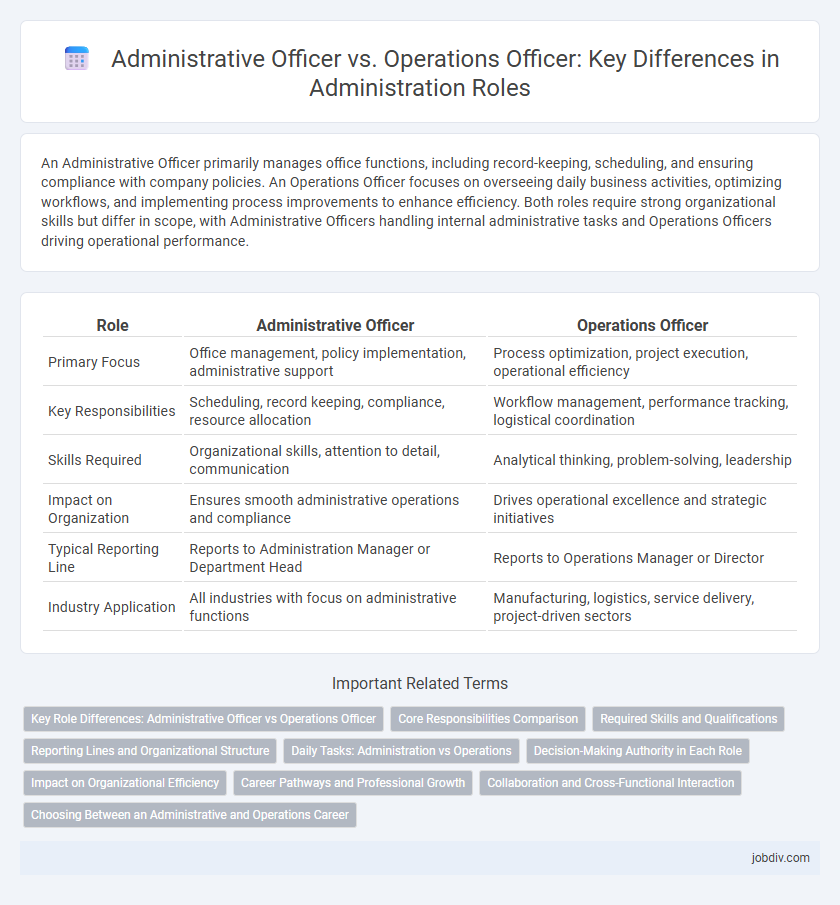An Administrative Officer primarily manages office functions, including record-keeping, scheduling, and ensuring compliance with company policies. An Operations Officer focuses on overseeing daily business activities, optimizing workflows, and implementing process improvements to enhance efficiency. Both roles require strong organizational skills but differ in scope, with Administrative Officers handling internal administrative tasks and Operations Officers driving operational performance.
Table of Comparison
| Role | Administrative Officer | Operations Officer |
|---|---|---|
| Primary Focus | Office management, policy implementation, administrative support | Process optimization, project execution, operational efficiency |
| Key Responsibilities | Scheduling, record keeping, compliance, resource allocation | Workflow management, performance tracking, logistical coordination |
| Skills Required | Organizational skills, attention to detail, communication | Analytical thinking, problem-solving, leadership |
| Impact on Organization | Ensures smooth administrative operations and compliance | Drives operational excellence and strategic initiatives |
| Typical Reporting Line | Reports to Administration Manager or Department Head | Reports to Operations Manager or Director |
| Industry Application | All industries with focus on administrative functions | Manufacturing, logistics, service delivery, project-driven sectors |
Key Role Differences: Administrative Officer vs Operations Officer
An Administrative Officer primarily focuses on managing office functions, overseeing clerical tasks, and ensuring compliance with organizational policies to maintain smooth administrative workflows. An Operations Officer concentrates on coordinating daily business activities, optimizing operational processes, and implementing strategies to enhance efficiency and productivity. The key role difference lies in Administrative Officers handling internal administrative support, while Operations Officers drive operational execution and resource management.
Core Responsibilities Comparison
Administrative Officers manage organizational policies, oversee office functions, and ensure compliance with regulations, focusing on documentation, budgeting, and resource allocation. Operations Officers concentrate on streamlining day-to-day processes, optimizing workflow efficiency, and coordinating cross-departmental activities to achieve operational goals. Both roles require strong leadership and communication skills but differ in scope, with Administrative Officers emphasizing organizational governance and Operations Officers prioritizing process execution.
Required Skills and Qualifications
An Administrative Officer requires strong organizational skills, proficiency in office management software, and excellent communication abilities to oversee daily administrative tasks and ensure operational efficiency. An Operations Officer demands analytical skills, strategic planning capabilities, and experience in workflow coordination to manage and optimize business processes effectively. Both roles benefit from leadership qualities, problem-solving skills, and knowledge of regulatory compliance, but the Administrative Officer emphasizes clerical management while the Operations Officer focuses on process improvement.
Reporting Lines and Organizational Structure
An Administrative Officer typically reports to the Office Manager or Department Head, overseeing clerical staff and managing day-to-day office functions within a centralized organizational structure. In contrast, an Operations Officer reports directly to senior management or the Operations Director, coordinating cross-functional teams and ensuring operational efficiency in a decentralized or matrix organizational framework. Reporting lines for Administrative Officers emphasize internal support roles, while Operations Officers hold a strategic position influencing organizational processes and workflow integration.
Daily Tasks: Administration vs Operations
Administrative Officers manage daily office functions, including scheduling, record-keeping, and coordinating communication between departments, ensuring organizational efficiency. Operations Officers focus on implementing business processes, monitoring workflow, and optimizing resource allocation to enhance operational productivity. Both roles require strong organizational skills but differ as Administrative Officers handle internal administrative support, while Operations Officers drive process improvement and operational execution.
Decision-Making Authority in Each Role
Administrative Officers primarily hold decision-making authority related to policy implementation, resource allocation, and internal organizational procedures, ensuring compliance with regulations and governance standards. Operations Officers exercise decision-making power focused on the practical execution of workflows, logistics coordination, and performance optimization to meet operational targets effectively. The scope of authority for Administrative Officers tends to be strategic and compliance-oriented, while Operations Officers make critical tactical decisions that directly impact day-to-day business operations.
Impact on Organizational Efficiency
Administrative Officers streamline office management by optimizing resource allocation, enforcing policies, and coordinating internal communications to enhance organizational efficiency. Operations Officers drive process improvement initiatives, oversee workflow automation, and manage day-to-day operational activities that reduce bottlenecks and increase productivity. Both roles synergistically impact organizational performance through strategic planning, effective task execution, and continuous efficiency monitoring.
Career Pathways and Professional Growth
An Administrative Officer typically advances through roles centered on organizational management, policy implementation, and compliance oversight, gaining expertise in administrative systems and leadership. An Operations Officer's career pathway often involves increasing responsibility in process optimization, logistics coordination, and operational strategy, emphasizing analytical skills and cross-functional collaboration. Both roles offer professional growth through certifications like Certified Administrative Professional (CAP) or Certified Operations Manager (COM), with advancement opportunities into senior management or specialized operational leadership positions.
Collaboration and Cross-Functional Interaction
Administrative Officers coordinate internal processes and manage office resources to streamline daily operations, ensuring efficient communication across departments. Operations Officers drive cross-functional collaboration by overseeing project execution and aligning teams from various departments to achieve organizational goals. Both roles require strong interpersonal skills to facilitate cooperation between administrative functions and operational units, promoting seamless workflow integration.
Choosing Between an Administrative and Operations Career
Choosing between a career as an Administrative Officer and an Operations Officer depends on skill sets and organizational impact; Administrative Officers excel in managing office functions, compliance, and internal communication, while Operations Officers focus on streamlining processes and optimizing supply chains. Administrative roles typically require expertise in document management, regulatory adherence, and stakeholder coordination, whereas operations roles demand strong analytical abilities, project management, and strategic planning. Understanding these distinctions helps align career goals with organizational needs, ensuring effective role performance and professional growth.
Administrative Officer vs Operations Officer Infographic

 jobdiv.com
jobdiv.com